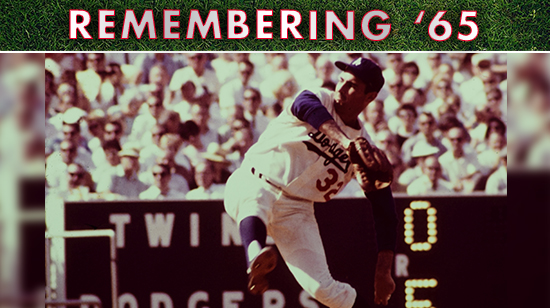By Jon Weisman
When might you be having a charmed season? When you’re scoreless with two out in the bottom of the 10th inning, Sandy Koufax bats for himself and walks, and then Roberto Clemente — of all people — drops a fly ball to allow the game-winning run to score.
That’s what happened August 14, 1965 at Dodger Stadium to allow the Dodgers to win, 1-0.
“It was sinking all the way,” Jim Gilliam, who hit the ball at Clemente, told Frank Finch of the Times. “Clemente first had his glove up in front of his chest, but at the last moment had to shift it. That’s when he muffed the ball.”
Said Clemente: “I was groping for the ball. I lost it.”
Though there were still many skeptics about the ’65 Dodgers, one who saw their potential was Pirates third baseman Bob Bailey.
“They’re not just giving an 80% effort like some teams,” Bailey told Times columnist Sid Ziff. “They go all out. They go for the extra base, the squeeze bunt, the impossible catch. And, of course, they’ve got tremendous pitching.”
But rather using the Clemente game to launch like a rocket to the National League pennant, the Dodgers would have one of their bumpiest weeks of the year.
Batting .295 with five homers, starting pitcher Don Drysdale hit seventh for the Dodgers on August 15, but struck out twice and took a 4-2 loss to the Pirates on the mound, the first of two consecutive defeats that reduced their NL lead to half a game.
Then, in front of an feisty home crowd August 17, Los Angeles barely staved off a fall from first place.
“The fast-increasing colony of boo birds at Dodger Stadium changed hoots into huzzahs,” wrote Frank Finch of the Times, after the Dodgers rallied from a 2-1 deficit in the seventh inning to retain their hold on the National League lead. Jims Gilliam and Lefebvre singled in the tying and go-ahead runs.
A day later, there was no saving them. After Koufax couldn’t hold a 3-1 lead in the eighth inning, Maury Wills’ 12th-inning error opened the door for three Philadelphia runs and a 6-3 defeat. Milwaukee moved into first place, with the Giants only .001 behind heading into a three-game series at San Francisco — the kickoff to a 18-day, 17-game roadtrip.
Not a relaxing time for Dodger fans at all.
The journey began with a 15-inning daytime marathon (that meant 27 innings in less than 24 hours) that could have been a sprint if the Dodgers were sharper. Wes Parker made a first-inning error that was followed immediately by a home run by Willie Mays. Drysdale homered in the sixth and took a two-run lead into the late inning, but like Koufax the night before, he couldn’t finish, allowing a tying homer to Tom Haller with two out in the ninth. In the 12th, 18-year-old Willie Crawford was on his way to score the go-ahead run but turned back because he had missed third base.
Mercifully, “Sweet Lou” Johnson’s two-run homer in the 15th inning put the Dodgers ahead to stay in an 8-5 victory that moved Los Angeles back into first place. Finch wrote that the Dodgers overcame “a series of bad breaks that would have blown a less-guttier gang sky-high.”
A day later, the Dodgers were back in second place again, with a 5-3 loss to the Giants. And a day after that, the Dodgers were back in first place again, with Wes Parker’s 11th-inning homer giving them a 6-4 victory at San Francisco.
Johnny Podres, the 1955 World Series hero, got the win with two shutout innings of relief — after struggling with a sore arm and a 6.23 ERA since June 1. Podres had allowed 11 runs in his previous 12 2/3 August innings.
From Ziff:
Podres was working so hard in the 11th the perspiration was pouring down his face although it was cold enough in the park to freeze a mackerel.
“It sure makes you feel good to help the ball club,” said Podres with a sigh, “after what I’ve gone through there for months. It’s been almost impossible for me to smile or even act human. A guy can get down when his arm is hurting.”
By this point, Ziff, who was among the media skeptics in July, was describing the Dodgers as a “team of destiny.”
The next day, Juan Marichal would face Sandy Koufax, with John Roseboro behind the plate for the Dodgers, and the entire Dodger world would be turned upside down.





oldbrooklynfan
In those days, I was spared going through these tough days inning by inning as I kept up with the team in the newspapers the following days, except when they were on TV.
Now it’s more like the days when they were back here in Brooklyn.
But I’ll take modern technology, in this case, right now.